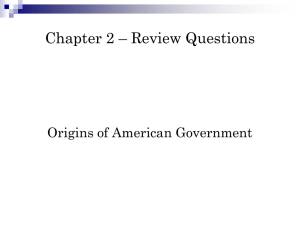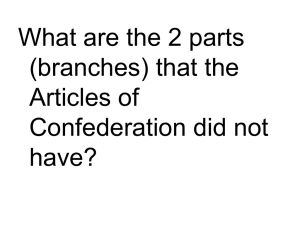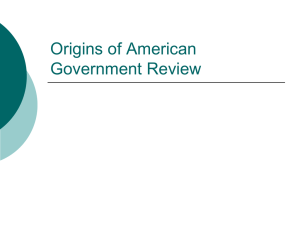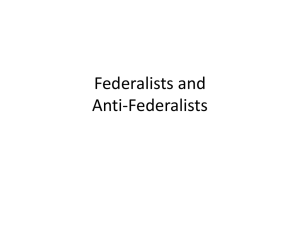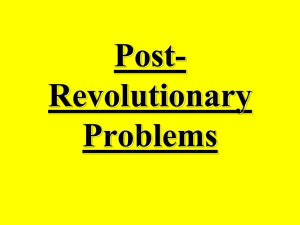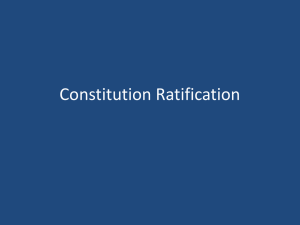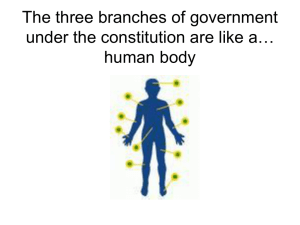Chapter 9: Creating A Nation
advertisement
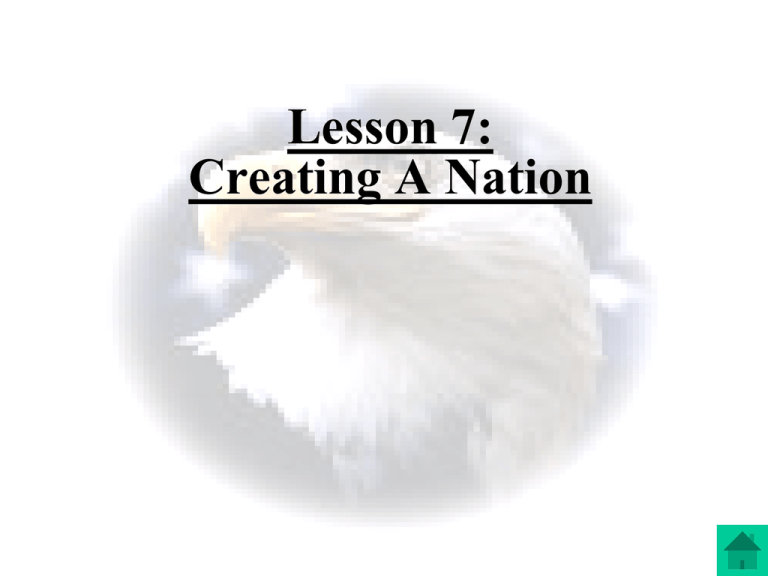
Lesson 7: Creating A Nation Bellwork: October 28, 2013 On the back of your study guide, define the following terms: Amend Ratify Compromise A Loose Confederation 1.constitutiona document thatSection sets out1: the law, principles, organization, and processes of a government A Loose Confederation 2. States wrote constitutions in order to spell out the rights of their citizens and to limit power of federal government. Articles of Confederationour country’s first constitution *It was a loose alliance of the 13 states It had many weaknesses. • 3. Weaknesses of the Articles of Confederation? No executive to carry out laws Congress lacked the power to tax. Congress could not regulate trade between states and foreign countries. 4. Noah Webster Land Ordinance of 1785 - Provided a way for settling land north of the Ohio River 5. The Northwest Ordinance -a territory could ask Congress to be admitted as a state. --a population of 60,000 needed to become a state. -became the first law in US history to restrict the practice of slaveholding Money problems? States owed money after the A.R. Continental dollars were worthless. States printed their own money. Depression – period when business activity slows, prices fall, and unemployment rises States refuse to trade with each other Stocked many British goods that they could not sell Great Britain makes it difficult for American ships to enter its ports and makes the West Indies off limits to any American trader. Farmers experience extreme hardships/lose land Daniel Shays - led a rebellion along with farmers and attacked courts in Massachusetts • Massachusetts • farmers could not pay their debts •government authorities jailed them or seized their property • discontent = rebellion • People doubted the government and the Articles of Confederation. • Americans such as George Washington called for a convention to revise the Articles of Confederation The Constitutional Convention Setting the scene……….page 206 6. What was the purpose of the Constitutional Convention on May 25, 1787? (Philadelphia) ---to revise the Articles of Confederation Why did many people call for changes in the Articles of Confederation? --believed the government failed to solve the nation’s economic problems ---Rhode Island was the only state who did not send a delegate. The Delegates? Sworn to secrecy? 7. Draw a venn diagram and compare the New Jersey and Virginia Plans. Virginia Plan *Two house legislature *seats awarded by population *Strong national government New Jersey Plan Both *3 Branches of government Rival plans Debated *Edmund Randolph James Madison *One house legislature * liked by small states *William Paterson *Each state would have one vote regardless of population. 8. Each side gave up something in order to achieve unity The Great Compromise --resolved the conflict between the Virginia and New Jersey Plans --creation of a two-house legislature --each state=two seats in the Senate --seats in the House of Representative=based on population 9. Compromises between North and South: Three-Fifths Compromise (only 3/5 of slaves would be counted for both representation and taxation.) Congress agreed not to ban slavery in the south for 20 years. 10. September 17, 1787- U.S. Constitution was signed 11. Founding Fathers –Leaders who laid the ground work for the U.S. government 12. Republic..on your own PREDICT and EXPLAIN People Can Observe and Learn From Others: Enlightenment thinkers Rome The Constitution American Experiences Magna Carta (Britain) Mayflower Compact What did the Founding Fathers learn from the example of the Roman Republic? – --the value of public service What are two basic virtues for a republican government according to Roman warning? (page 212) – --educated and dedicated citizens The Roman Example What basic ideas from England’s Magna Carta was used in the Constitution? (Britain) --People have certain guaranteed rights. --Leaders must obey laws. Which Enlightenment writer expressed the idea that the relationship between government and the people it governs is a social contract? --John Locke Separation of Powers (Baron de Montesquieu) • Division of responsibilities of branches / no branch has too much power • Legislative branch makes the laws (Congress) • Executive branch carries out the laws (President) • Judicial branch interprets the laws (Supreme Court) Baron de Montesquieu3 branches of government 14. “The greatest single effort of national deliberation that the world has ever seen.” John Adams 15. Compare the Federalists/Anti -Federalists. Federalists Anti-Federalists *supporters of the Constitution *opponents of the Constitution *James Madison *Alexander Hamilton *believed the Constitution must spell out ways to protect people’s basic rights *Federalists Papers *favored a strong National government *John Hancock *Samuel Adams *Patrick Henry *favored strong state governments The Constitution had to be ratified by 9 of the 13 states. Madison said about the United States most eminent citizen, Benjamin Franklin: “Doctor Franklin, looking toward the President’s chair, at the back of which a rising sun happened to be painted…’I have,; said he, ;often and often in the course of the Session… looked at that [sun] behind the President without being able to tell whether it was rising or setting; but now, at length I have the happiness to know it is a rising and not a setting Sun.’” 16. Anti-Federalists agreed to ratification if a bill of rights was added to the Constitution. 17. All states eventually ratified!! Delaware – first state to ratify or approve the Constitution Rhode Island – last state to ratify the Constitution 18. George Washington “First in war, first in peace, first in the hearts of his countrymen.” Which of these statements BEST describes the ratification of the Constitution? A. In key states, the tide slowly turned in favor of ratification. B. Each state quickly approved the Constitution. C. Most states were initially against ratification. D. In the end, only Rhode Island refused to ratify the Constitution. 19. How did the Bill of Rights become part of the Constitution? (Trace) • Congress created 12 amendments. • States approved 10 of them. • 10 became our Bill of Rights through the amendment process. 20. In 1792, Congress declared the bald eagle to be an official symbol of the new nation. 21. The13 stars and stripes represent the 13 American colonies. http://americanhistory.si.edu/starspangledbanner/ Name __________________Date____________Lesson 8: __ Executive Branch Legislative Branch Judicial Branch Choose ONE topic and write a well developed paragraph or essay. 1. Write a paragraph describing the causes and effects of the financial crisis after the Revolutionary War? 2. How did the states limit powers of the central government under the Articles of Confederation? 3. Analyze the concept of leadership. Describe the “Father of the Constitution.” 4. Persuading the 13 original states to support a new Constitution for the United States required a number of compromises. Explain how the U.S. Constitution was developed through a series of at least three compromises, and analyze how those compromises affected the country. 5. The framers of the Constitution used the best ideas from a variety of sources. Explain how the ancient Roman Republic, British traditions, the American colonial experience, and the ideas of the Enlightenment helped shape the system of government in the United States. 6. Explain how ratification of the Constitution was threatened by disagreements between the Federalists and the Anti –Federalists and explain the position of each. 7. Analyze the concept of conflict. Why did the states have trading problems under the Articles of Confederation. 8. Explain why the delegates to the Constitutional Convention thought that secrecy was so important.


